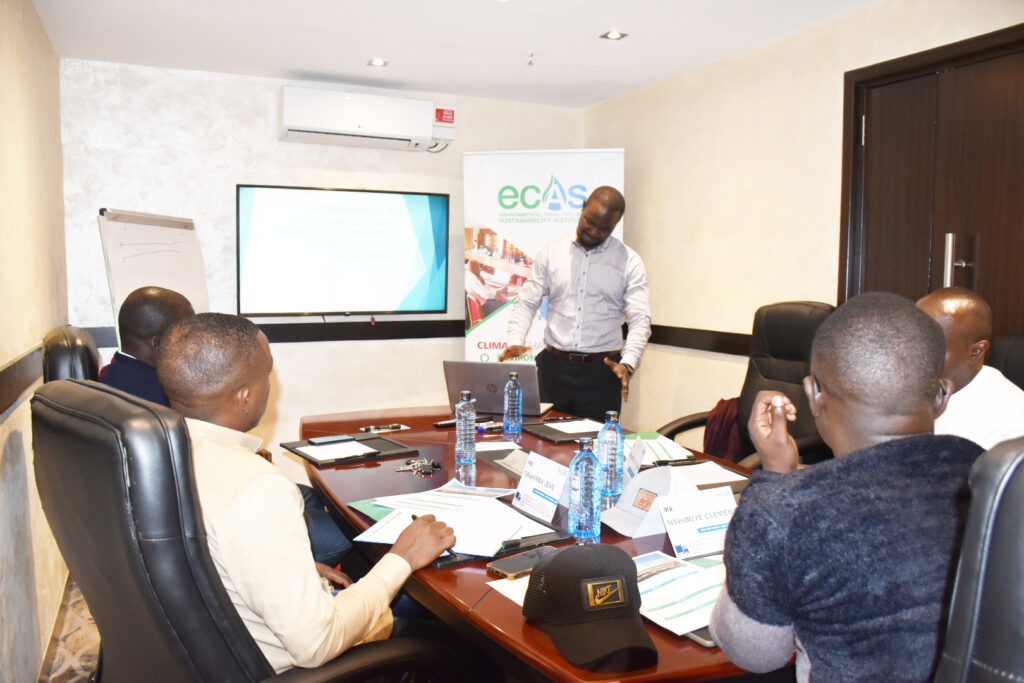
INTERNATIONAL TRAINING ON ENVIRONMENTAL AND SOCIAL IMPACTS ASSESSMENTS
Course Background
The Environmental and Social Impact Assessment training course provides the necessary concepts, knowledge, and good practices for managing environmental and social impacts resulting from development projects. This is a process of evaluating the likely environmental and social impacts of a proposed project or development, considering inter-related socio-economic, cultural, and human-health impacts, both beneficial and adverse.
This training course by ECAS Institute aims to help those who engage in development projects understand how their projects could affect the environment and how the environment could affect their projects. Then by using a formal methodology, it will maximize the positive impacts, and negative ones will be reduced or minimized to acceptable levels. Moreover, it will provide the delegates with a holistic picture of the main trends of interaction between environment, society, and business through discussing how and when business interacts with the surrounding environment and society how the environment reacts to such interaction and how society could affect and be affected by business and what is the expected role of business in improving both environment and society, not just through remediation for the negative impacts, but through value creation and better maximized positive impacts.
Objective of the Training
By the end of this training course, the participants will be able to:
- Understand the main components of the environment and current environmental issues like climate change and sustainable development
- Learn the main environmental and social impact that could result from the development project.
- Use a variety of management techniques, and analytical tools to assess the environmental and social impact.
- Perform plans and other controlling techniques for the impact result from the projects.
- Involve the affected and interested public in all aspects of the project.
What you will Learn
Upon completing this intensive Environmental and Social Impact Assessment Training, Course, participants will gain a comprehensive understanding of:
- Environmental Safeguards’ Role: The significance of ESIA in enhancing investment performance and gender mainstreaming in development.
- Assessment Requirements: Procedures and requirements for environmental and social assessments from major international organizations and donors for development projects.
- Stakeholder Roles: The roles of different stakeholders in implementing environmental and social mitigation measures.
- Best Practices and Monitoring: Safeguards best practices, effectiveness monitoring, and reporting procedures to ensure sustainable development and compliance with international standards.
Duration & Program
The workshop will be held in 20 days inclusive of field work. The training will be held in Nairobi Kenya from (TBC) The venue will be (TBC)
Target Participants
This course is designed for Engineers, Project Managers, Environmental and Social Safeguard Specialists, Government Officials, NGO Representatives, and other professionals involved in planning, designing and managing infrastructure, environment, gender and development-related projects.
Training Modules
|
No |
Module |
Details |
|
| 1. |
Introduction and Overview of Environmental and Social Impact Assessment (ESIA) |
|
|
| 2. |
Public Involvement, Screening and Scoping |
|
|
| 3. |
Impact Analysis |
|
|
| 4. |
Mitigation and Impact Management |
|
|
|
5.
|
Understanding Environmental Safeguards |
|
|
| 6. |
Understanding Social Safeguards |
|
|
| 7. |
Overview of Major International Frameworks |
|
|
| 8. |
Environmental Safeguards |
|
|
| 9. |
Social Safeguards |
|
|
| 10. |
GEDSI (Gender Equality, Disability, and Social Inclusion) |
|
|
| 11. |
Gender-Based Violence |
|
|
| 12. |
Monitoring, Evaluation, and Compliance |
|
|
| 13. |
ESIA Report Preparation |
|
|
| 14. |
Case Studies and Practical Applications |
Analysis of real-world ESIA case studies (e.g., infrastructure projects, mining operations, industrial development) Discussion of challenges and best practices in conducting ESIA Ethical considerations in ESIA practice |
|
| 15. |
Closure and Issue of Certificates |
||
Training style
The modules will be taught through PowerPoint presentations, and lectures and will include a case study/field visit, breakout sessions, and other interactive discussion components.
The course will also include a few guest speakers, both in person and via Zoom and other online learning platforms for overseas speakers. This provides useful real-world insights alongside the more theoretical aspects of the course.
The teaching faculty shall consist of experienced decision makers, as well as practitioners and representatives from established educational and research institutions active around climate change, engineering and international development. Throughout the course, theoretical presentation of concepts will be moderated and more group discussions and plenary engagements will be optimized. Powerpoint presentations will be made by facilitators and resource persons, to highlight key concepts before embarking on group work.
9. General Notes
- Training manuals and additional reference materials are provided to the participants.
- Upon successful completion of this course, participants will be issued with a certificate.
- We can also do this as a tailor-made course to meet organization-wide needs. Contact us to find out more: info@ecasiafrica.org.
- Payment should be sent to our bank account before the start of training and proof of payment sent to: info@ecasiafrica.org.

